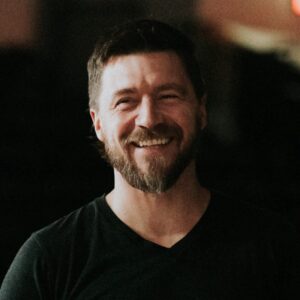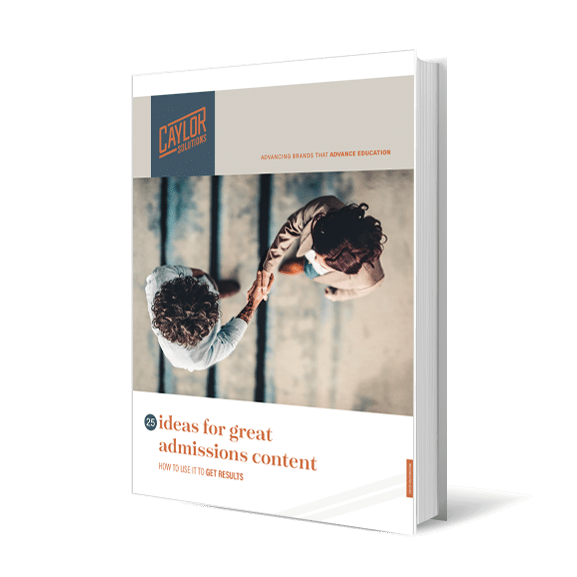Crisis Communication in Higher Ed: Pepperdine’s Wildfire Response
See how Pepperdine University redefined crisis communication in higher ed by prioritizing safety, faith, and storytelling during the California wildfires.
Featured
While it seems to be on the wish list of lots of higher ed marketers, I believe video storytelling would fit better on the “must have” list.
Right now, there are a lot of options out there for someone looking for an education.
They could go right into the industry through a low-level entry job.
Another option would be to learn a set of skills by compiling a series of self-paced online courses.
And of course, there’re always YouTube videos out there that will help you learn almost anything.
On top of all the educational options available to prospective students, the rising cost of tuition is making the option of going to a higher education institution more difficult for more families.
Then, when we think of the looming demographic crisis and the enrollment cliff that’s coming with it, all of these issues build up to create some strong headwinds against our enrollment efforts.
Telling the authentic transformative stories of students and staff on your campus helps foster real emotional connections.
Stories are everything – it’s time to show the impact your university has had on those in your community.

In our conversation, he shares the importance of letting your students tell their stories.
In this episode, we explore various aspects of video storytelling that can absolutely transform the results you’re getting in your enrollment marketing.
At the beginning of our conversation, Ryan shared his own deeply personal story of how his life was drastically changed during his college years.
Now, as a father with three children, he began to wonder if perhaps his children really didn’t necessarily need the higher education experience, that maybe they could forge a better path for them without the high tuition costs.
But then came the call from his alma mater asking him to create a documentary of the life of his college basketball coach.
For Ryan, it was an emotional project, because the basketball coach had had a profound impact on him while he was in college.
And that’s when his feelings about higher education for his children began to change.
So, we start telling this story, and I’m getting emotional as I’m interviewing [my college basketball coach].
I’m just thinking, “I love my job! It brings so much life to me, and I’m so grateful.”
We finished this documentary, and I have this epiphany of the work in higher ed.
My life changed in higher ed because of the relationships, the professors, the people in my life from whom I learned so much. It was such a pivotal time in my life.
That’s where the idea to launch Enroll Films came from. I realized my passion for this industry.
[In order to help this industry grow,] people need to be inspired by the stories that are inside of their institutions.
Ryan had an experience during his college years.
For him, it was a deeply transformative experience, and only when he began to tell the story, did he feel the full weight of it.
I’m convinced that schools who commit to selling the experience of their college campus – more so than they sell their programs – are the ones who’ll see greater success.
When you sell the experience rather than your program, you’re more likely to find mission-fit students for your school.
The reason for that is because when you sell the program, it will look like the program sold by all the other schools out there.
But when you sell the experience of your campus, you’re selling the distinctives that only you have to offer.
These distinctives are more likely to attract the students who are desperate for who you are and what you have to give them as an institution.
Another powerful component to video storytelling is how it shows prospective students the beautiful transformation that can happen in their lives by enrolling in your school.
My goodness, what [my alma mater] allowed my wife, our friends, and I to experience, and what all campuses allow you to experience, is life on your own in a protected [space].
[College is] a place that has some boundaries where you can really figure out who you are.
You can make mistakes at a university that you can’t make when you’re in your first real job or when you’re in the real world.
I’m thinking about my 16-year-old son, and I really want him to experience community life in a controlled environment. I want him to experience friendships that are so different than the friends that he has in high school and to really experience life in a whole other way.
How do you convey this sense of safety, community, and transformation?
Of course, higher ed marketers should use all of the tools in their toolbox—blogs, emails, print articles, social media, and more.
But there are so few mediums that capture this feeling better than video storytelling.
Since my co-host, Troy Singer, and I are constantly interviewing people on our podcast, we were very curious about Ryan’s interview tips for great video storytelling.
We asked him, and he delivered!
When we set up for an interview, I’ll tell the [crew], “As soon as you’re set, hit record and nudge me so that I know that we’re actually rolling [even though the interview subject is unaware].”
[I begin interviews like this] because when you start rolling people tend to clam up.
What I’ll do at that point is say, “Hey, before we start and really get into the interview…”
And I’ll just play it off like, “It’s just you and me here. Tell me, why do you [do what you do]? Why are you here? Why do you really care about this work?”
Then, I’ll just let them go. That’s typically one of the best sound bites because they don’t feel like they have to give a canned answer.
This is a creative way to get past your interview subject’s interview jitters.
As Ryan points out, you’ve got to get to a place in the interview where it feels like the most natural conversation possible.
What I try to tell people is I just want to have fun. I want this to feel as real as it can.
If we can just remember that we’re hanging out, having a cup of coffee together, and I want to know their story. I’m genuinely interested.
It doesn’t have to be perfect. The beautiful thing about editing is we can clean stuff up.
[You don’t want your interview subject to feel] like their answers have to be perfect.
It’s in the “uh’s” and in the “um’s” or in the moments where you can’t answer because you’re moved with emotion—that’s going to speak louder than probably anything that you are going to be able to say.
Some people are afraid to get emotional, so they might stop themselves from even reflecting.
[But as the interviewer, we should be comfortable saying,] “Wow, that sounds like that was probably really hard for you.”
Then, just letting it breathe.
If we as higher ed marketers can get more comfortable as interviewers, our interview subjects will also be able to relax.
And this is where we can harness the emotional power of video storytelling.
Like all of our blog post reviews of The Higher Ed Marketer podcasts, there’s so much more to learn in the podcasts themselves.
Listen to our interview with Ryan Koral to get even more insights into:
You’re in luck! We’ve curated 25 awesome ideas inspired by top higher ed institutions across the country and put them in one handy guide: 25 Ideas for Great Admissions Content. 
Get inspired.
Get enrollment results.
Get 25 Ideas for Great Admissions Content.
Download your copy today!
Featured image by Viks_jin via Adobe Stock
Subscribe to The Higher Ed Marketer podcast today!